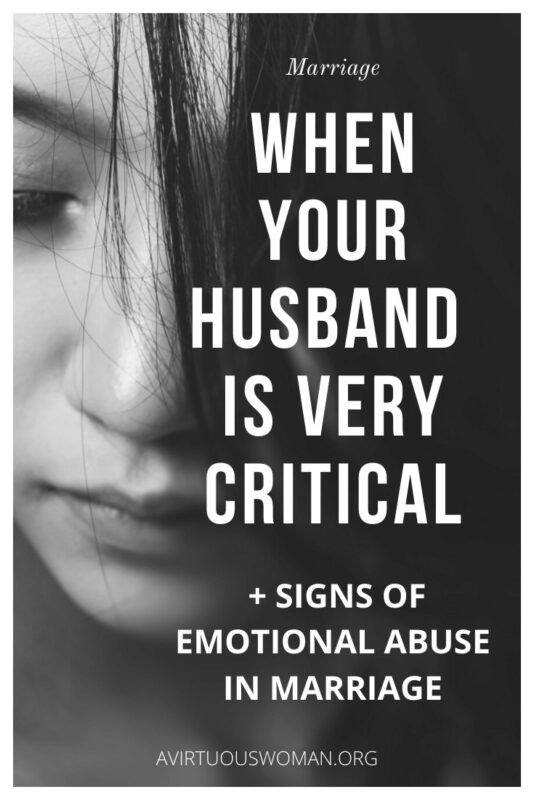Q & A: When Your Husband is Critical
This is an important post. Marriage is hard enough without one spouse being overly critical of the other. Today I’m answering a reader’s question and talking about what to do when your husband is critical of everything you do and how this can be a form of emotional abuse.

I received this comment the other day and rather than just answer it in the comments, I decided it deserved it’s own post.
Q: Hi Melissa! I hope you are well! In regard to being the Proverbs 31 wife, I have a husband who is very critical of everything I do. He says he is “just playing,” but nonetheless, it hurts. I feel as if I can’t do anything right, and compliments are few and far between. I am tired of being disrespected by him that I am considering leaving. What would you suggest? You are so wise about this… Thank you!
A: My heart breaks when I get questions like this. You might be surprised to know the number of emails and comments I receive from women who are struggling with these kinds of issues – or maybe you wouldn’t be.
Unfortunately, this is a far too common problem.
But before I begin, I want you to know that whatever your husband says critical to you – it’s not about you, it’s about him.
Remember, your happiness is yours. He is not the source of your happiness. This is, of course, much easier said than done. But, it’s important to separate yourself from the situation.
You don’t need to feel bad about yourself just because he wants you to feel bad about yourself. Unfortunately I know all too well how much negative talk can beat you down and wear away your self esteem – especially after years of enduring constant criticism.
The words we say matter.
“Let no corrupting talk come out of your mouths, but only such as is good for building up, as fits the occasion, that it may give grace to those who hear.” Ephesians 4:29
“Be not rash with your mouth, nor let your heart be hasty to utter a word before God, for God is in heaven and you are on earth. Therefore let your words be few.” Ecclesiastes 5:2
God’s Word tells us to use our words to lift each other up! When your husband is critical and overly so, he’s tearing you down and not honoring God.
When Your Husband is Critical
What concerned me the most about your question is that you said you feel like you can’t do anything right. This sounds like a very unhealthy dynamic to me.
Here are a few questions you can ask yourself if your husband is critical:
- Is he otherwise, kind, funny, and thoughtful?
- Has he recently become critical?
- Does the negativity seem out of character to his behavior in the past?
- Has the criticism gotten worse over the years?
- Is he like that with everyone? Or just you?
- Is he depressed and unhappy?
- Is he controlling in other areas of your relationship?
- Do other people see him as kind and loving but at home he’s different?
Let’s talk about a few ways you can try to deal with a critical husband before you consider leaving. If your husband has always been this way, that may be a sign he’s not going to change. However, let’s assume he doesn’t know what he’s doing for a moment.
If the behavior is new or a recent change, he may be struggling with stress, depression, or something else.
#1 Pray for Your Husband
The first step to solving any problem is to cover it in prayer. Pray for your husband’s eyes to be opened and for his heart to be changed.
I suspect you have already prayed about this problem. But either way, it’s important to continue to pray for your husband and your relationship. Ask God to show you exactly what you need to do.
#2 Talk to your Husband
It’s important to share your feelings with your husband. He needs to know his words hurt.
In a healthy relationship, you can talk about your feelings and issues you’re having without fear of being shut down, criticized, or blamed.
If your husband cares about your feelings, he will be willing to hear how you feel when he says negative words to you. You can begin the conversation something like this:
- I feel belittled when you talk down to me.
- I feel discouraged when you criticize how I clean the house.
- I feel hurt when you tell me I’m not raising the kids right.
- I feel sad when you yell at me for being late with dinner.
- I feel bad about myself when you mention my weight.
It’s important when having a healthy discussion with your spouse that you keep the focus on your feelings instead of the blame. Stay calm and use a calm tone of voice. You don’t want your spouse to feel attacked. Instead, you want him to understand how you feel. You want him to feel empathy and see the need to be more positive and kind.
Three points to make:
- how you feel
- why you feel the way you feel
- what he could do/say instead
You can ask him if he’s feeling stressed or depressed about something that is causing him to react more negatively. His reaction to your conversation is a good indicator of what’s really going on.
In an unhealthy relationship, when you try to discuss how you feel about something (like his being critical of you), you will find that he denies the behavior, blames you, twists your words, or somehow makes the discussion about you and your behavior instead of his behavior. Or, he may try to say you’re just as critical as he is.
Criticism Can Destroy a Marriage
When a husband is critical of his wife, it can be incredibly hurtful.
” In a healthy relationship, a couple would naturally offer advice or suggestions to the other. This would be based on a healthy interdependence in which each one would influence the other, with love. Criticism, on the other hand, tears a person down while remaining nonproductive in resolving marital issues.” – Neil J Lavender Ph.D. at Psychology Today
If your spouse was not always critical of you and has fallen into a pattern of negative behavior, it can be a sign that they are very unhappy with themselves or other things happening in their life.
Talking with a counselor to determine the root cause for the behavior could be a good idea if your husband wants to work on your marriage and admits he has a problem.
When Criticism is Abusive
I’ve written about emotional abuse before and it’s something I’m very passionate about since I’ve experienced many different forms of abuse in my lifetime. How can you know if his criticism is emotionally abusive?
The first test would be to ask yourself if he takes responsibility for his behavior or if he denies he did anything wrong. A husband who truly wants the best for you and your marriage will not place all of the blame on you, but will accept some responsibility and be willing to work on change.
Note: I want to point out that this works both ways – wives are often abusive to their husbands as well.
Emotional Abuse can include:
- belittling and critical words
- blatant disrespect and covert disrespect
- pointing out your every flaw
- never complimenting you, but always tearing you down
- wanting to control how you do things
- making jokes about you that don’t feel funny
- making you feel bad about yourself
- making you feel shamed
When you feel like you can’t do anything right, your self image begins to erode and you begin to second guess yourself. It can lead to depression, feelings of shame, and hopelessness.
I’ll talk more about how to know if you are in an emotionally abusive relationship in just a moment, but first let’s talk about practical things you can do to improve your situation right now.
Healthy Boundaries in Marriage
Healthy boundaries are so very important. They are important for every kind of relationship and especially important in marriage.
What are healthy boundaries?
Healthy boundaries allow both people in a relationship to feel safe, comfortable, and loved. Healthy boundaries make it possible for you to develop a healthy, positive self esteem.
You can think of healthy boundaries kind of like a fence. Let’s look at this analogy.
If you think of yourself like a house, your boundaries are the fence around that house. The yard inside that fence would be things like your feelings, your thoughts, your actions, the things you do and feel and say.
You are responsible for maintaining your own yard, inside your own fence. No one else is responsible for your yard. Now, your husband also has a yard and a fence. He is responsible for his own yard – his feelings, his actions, his thoughts. The fence around his yard would his boundaries.
What happens when someone jumps your fence and tramples all over your flower garden? They have violated your boundaries.
The problem with boundaries is that many of us haven’t learned how to have healthy boundaries in our relationships.
I want you to remember this: You are not responsible for anyone else’s feelings, thoughts, actions, or reactions. You are only responsible for your own feelings, thoughts, actions, and reactions.
What do I mean?
If you do something that another person doesn’t like, you are not responsible for how they react, how they feel about it, or any action they take. For example, if you say no to a request because it makes you uncomfortable, you don’t have time, or it violates your boundaries in some way, you are not responsible for that person feeling disappointed, you are not responsible if they get angry, you are not responsible if they act out.
“For each will have to bear his own load.” Galatians 6:5 ESV
How do you create healthy boundaries?
Healthy boundaries are created when you speak the truth in love.
Example #1
So, for instance, let’s say your husband comes home from work and he’s immediately dissatisfied with the way the house looks when he gets home. He doesn’t take into consideration how exhausted you are from taking care of a sick baby all day. He comes in and says, “Wow. The house looks like a tornado hit it. What did you even do all day?”
You can calmly say, “When you say that, it makes me feel like a failure. You don’t know that the baby didn’t nap and I had no time to do anything except hold her all day. I know you’re disappointed that the house is a mess, but you are not allowed to talk to me with disdain.”
Example #2
Your husband comes home and says, “Why did you cook pasta again for supper? I’m so sick of pasta.”
You can calmly say, “I didn’t know you were tired of pasta. I’m sorry you feel that way. But you are not allowed to talk down to me and make me feel bad when I cooked dinner for you.”
Example #3
Your husband says, “I hate the way you clean the kitchen. I’ve told you I want you to do it a certain way.”
You can calmly say, “I worked hard to clean the kitchen. You are not allowed to criticize my cleaning routine.”
Okay, so I don’t know what your specific marriage looks like or how your husband is specifically critical of you. But I hope these examples give you an idea of how you can insist he respect you when he speaks to you. It’s important when establishing boundaries that you do your best to be consistent. Respond the same way each time.
Now, the problem is when you state your boundaries and he still doesn’t respect them. If he continues to disrespect your boundaries and requests for positive interactions, you may have to remove yourself from the situation when he fails to respect your boundaries.
What does it mean to remove yourself from the situation?
Removing yourself from the situation can mean a few different things and only you can decide which option is best for you.
- Leave the room. Tell him calmly why you are leaving the room.
- Leave the house. In some cases, leaving the house for a period of separation can create a crisis point and cause him to make the decision to change his behavior.
- Leave the marriage. In truly abusive situations, the abuser will rarely change. In these cases, divorce may be the best option. You can read my post, Biblical Grounds for Divorce.
Are you in an abusive marriage?
If your husband is critical and has a habit of putting you down all the time, you may be in an abusive marriage and not even realize it. Many women don’t realize they are being abused because their husbands don’t hit them or use physical force against them.
But verbal and emotional abuse in Christian marriages is more prevalent that you might imagine. Natalie Hoffman, author of the book Is It Me? Making Sense of Your Confusing Marriage, says:
“But emotional abuse? Is that even a thing? It is absolutely a thing. It is the most common type of abuse, and it is rampant in our churches. Why? Because it is the most hidden, unrecognizable, and untraceable of all the abuse tactics. Often, the victim is completely unaware that she is in an abusive relationship, and the abuser is in such complete denial that he is unable to see how destructive his behaviors are to his partner.” The One Sure Sign You are in an Emotionally Abusive Relationship, FlyingFreeNow.com
“Verbal abuse happens out of nowhere in a relationship. It’s a lot more calculating and insidious, causing people on the receiving end to question themselves, wonder if they are overreacting, or even blame themselves. Verbal abuse usually happens in private where no one else can intervene and eventually becomes a regular form of communication within a relationship.” – Jade Anna Hughes, 11 Common Patterns of Verbal Abuse
Signs of verbal and emotional abuse include but may not be limited to:
- belittling and degradation
- constant criticism
- negating your feelings
- making fun, poking fun
- making jokes that are hurtful and not funny
- domination, control, and shame
- blaming you for everything
- not taking responsibility
- silent treatment, aloof behavior
- yelling, screaming, and “blowing up”
- feeling like you need to “walk on eggshells”
Books to Read about Verbal and Emotional Abuse
What to Do If You are in an Abusive Marriage?
- Know that you are not alone. There are people who care.
- Find someone to talk to. Often, your pastor or other church members will not be the best people to talk to. I would encourage you to call a women’s shelter or talk to a trusted friend who has your back. If they don’t believe you, talk to someone else.
- Do not go to counseling with your abuser. Find a counselor who specializes in abuse and go alone. I probably would not recommend a Bible counselor or counselor at your church.
- If your counselor or anyone you talk to suggests you could make the abuse stop if you would improve your own behavior so as to “not upset him” find a different person to talk to.
- Remember that God loves you very, very much and He doesn’t want you to be abused.
- If you are in a dangerous situation, please get help. You can call the National Domestic Abuse Hotline at: 1-800-799-7233
Other posts I’ve written on this topic:
- Anger and Emotional Abuse Within Christian Marriages
- Emotional Abuse
- When “Pray Harder” isn’t the Answer
- Biblical Grounds for Divorce
Do you have any questions about marriage or abuse you’d like to have me answer? Let me know your thoughts in the comments below.











10 Comments